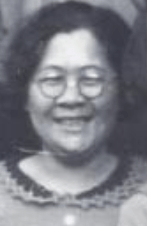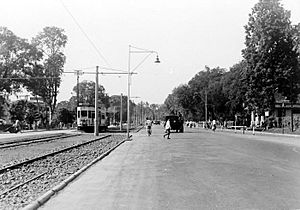Thung Sin Nio facts for kids
Quick facts for kids
Betsy Thung Sin Nio
|
|
|---|---|
| 汤新娘 | |

Thung, circa 1930s
|
|
| Born | 22 May 1902 Batavia, Dutch East Indies, Kingdom of the Netherlands
|
| Died | 5 January 1996 (aged 93) Eindhoven, Netherlands
|
| Nationality | Dutch, Indonesian |
| Education | Nederlandsche Handels-Hoogeschool |
| Occupation | Women's rights activist, physician, economist, politician, translator and teacher |
| Years active | 1930–1974 |
| Relatives | Phoa Keng Hek (cousin) Tan Sin Hok (cousin) |
Betsy Thung Sin Nio (Chinese: 汤新娘; pinyin: Tāng Xīnniáng, 22 May 1902 – 5 January 1996) was an amazing Indonesian-Dutch woman. She was a doctor, an economist, and a politician. She also worked hard for women's rights.
Thung was born into a rich and modern family in Batavia. Her family encouraged her to get a good education. This was very unusual for girls in Indonesia at that time. She first studied to be a bookkeeper. But because of social rules, women could not work in offices. So, she became a teacher instead.
In 1924, Thung went to the Netherlands School of Business in Rotterdam. She studied economics there. She earned a master's degree and a doctorate in economics. In 1932, she decided to study medicine at the University of Amsterdam.
While studying in the Netherlands, Thung met Aletta Jacobs. Jacobs was a famous women's rights leader. She inspired Thung to join the Dutch women's movement. Thung became an activist for women's rights. She wrote articles for feminist magazines in both the Netherlands and the Dutch East Indies.
After becoming a doctor in 1938, Thung returned to Batavia. She opened a medical clinic. She focused on helping women and children. She also continued to fight for women's suffrage, which means the right for women to vote. When the government wanted only European women to vote, she fought for all educated women to have this right. She won!
During World War II, Thung kept her medical practice open. She also helped at a public hospital. She even opened a private hospital for European patients. After the war, she became a medical officer for schools in Jakarta. She also entered politics. In 1949, she became the first woman elected to the Municipal Council of Jakarta. She represented the Persatuan Tionghoa.
From 1949 to 1965, she traveled a lot for her country. She worked as a translator for trade groups. She also worked as an economist on trips to Russia and China. After a big change in Indonesia in 1965, she left government work. In 1968, the government made Chinese citizens change their names. Thung refused and moved to the Netherlands for good. She kept working as a doctor there. In 1983, she was honored as a knight in the Order of Orange-Nassau. People in China, Indonesia, and the Netherlands remember her for helping women and children.
Contents
Early Life and Education
Thung Sin Nio was born on May 22, 1902, in Batavia, Dutch East Indies. Her father, Thung Bouw Kiat, was a landowner and community leader. Her mother was Tan Toan Nio. Her family was part of the wealthy Cabang Atas group. They were originally from Buitenzorg (now Bogor).
Her family had a long history of leadership. Her father's brother, Thung Tjoen Ho, was a Luitenant der Chinezen. This was a high government job in the Dutch East Indies. It was part of how the Dutch ruled the colony. Thung's family came from China in the 1800s. Her grandmother's family had been leaders in West Java since the 1700s.
Thung's mother, Tan Toan Nio, had brothers who were also important. One of her cousins was the famous paleontologist Tan Sin Hok. Thung was even engaged to him for a while.
Thung's father managed a farm. He was also a member of the Municipal Council of Batavia. Thung would later be elected to this same council. Her parents were very modern and wanted their daughter to study. This was unusual then, but common for their wealthy group. Many in her family had pushed for higher education. This included her cousin, Phoa Keng Hek, who was a social activist.
Thung went to Dutch schools. She finished high school in 1918. As a girl, she had few choices for more education. So, she became a bookkeeper in 1920. That year, her mother died. Her father had died in 1916. So, she moved to Cianjur to live with an aunt. Even with her degree, women of her social class were not allowed to work in offices. She spent her time sewing, cooking, and reading. She could only go out with an adult watching her.
Thung was not happy with this life. In 1922, she went back to school. She studied at the Dutch-Chinese Teachers' College in Jatinegara. She earned a teaching certificate in 1924. Then she taught for a short time at a Dutch elementary school in Bogor.
She wanted to learn even more. So, Thung decided to study abroad. On October 15, 1924, she enrolled at the Netherlands School of Business. She studied economics there. In 1926, she received a book from her classmates. It was by Aletta Jacobs, a famous women's rights leader. Thung wrote to Jacobs, who then invited her to visit. Jacobs introduced her to other feminists. Thung joined the Association for Women's Interests and Equal Citizenship. She became active in fighting for women's rights in marriage and work.
Thung also joined the Chinese student group, Chung Hwa Hui. She was on its board in 1926 and 1927. She gave talks about women's issues. For example, she spoke about Chinese girls' education in Indonesia. She also talked about the Montessori teaching method. She graduated in 1927 and earned her master's degree the next year. She then traveled in Europe before returning home in 1929.
Career and Activism
Early Work and Further Studies
In 1930, Thung started working at the Yang Seng Ie Hospital. She helped poor women suffering from hunger. She also taught mothers how to care for their babies. While working at the hospital, Thung started the First Chinese Girls' Boarding School. She was the director. She worked to convince Chinese parents to educate their daughters. After a year and a half, she went back to Rotterdam. She finished her doctorate in economics in 1932.
Thung then decided to study medicine at the University of Amsterdam. She felt there was a great need for women doctors in Java. In 1933, she joined a student group called the Study Club of Chinese Students. She continued her work for women's rights. She was inspired by Catharine van Tussenbroek, a doctor and feminist. Thung believed women needed to be financially independent.
She started writing articles for Chinese and Dutch women's magazines. She wrote for Fu Nu Tsa Chih and Vrouw en Gemeenschap. In her articles, she shared her own struggles with schooling. She also wrote about her journey to become financially independent.
Medical Practice and Women's Rights
After becoming a doctor in 1938, Thung returned to Batavia. On September 13, she opened her own medical practice. It was in her family home in the Salemba area. She focused on helping women and children. She taught classes for mothers on child care. She also did health checks for children.
At the same time, she wrote articles for magazines like Fu Nu Tsa Chih and Sin Po. She wrote about women's suffrage and other women's issues. Her articles often gave medical advice on child care and nutrition. She also wrote about education for women.
Thung was part of the Association for Women's Interests in the Netherlands. But the group in the Dutch East Indies only wanted European women to vote. So, Thung joined the Chinese Women's Association in 1938. She also started the Hutspot-club. This club brought together women from different backgrounds. She worked hard to get voting rights for Chinese women. She protested against the government's plan to stop non-Europeans from voting. She and other women collected thousands of signatures against this plan.
In 1941, a new proposal was made. It said that educated women of any race should be able to vote and hold office. This was a big step forward. The proposal was accepted in November 1941. That year, Thung also celebrated the ten-year anniversary of her Girls' Boarding School. She also celebrated five years of the school's trade program for women.
In 1942, the Japanese army invaded Java. They put all European doctors in camps. Thung opened a private clinic called San Te Ie Juen. It provided medical care to wealthier people. She also continued her own practice. She volunteered at a local hospital during World War II. In 1945, Indonesia declared its independence. Batavia was renamed Jakarta. From 1945 to 1951, Thung worked for the Ministry of Education. She checked the health of all schoolchildren in Jakarta. She measured their height and weight. She also made sure they received milk and food according to international standards.
Entering Politics and Later Career
In 1948, Thung ran for office. She was a candidate for the Persatuan Tionghoa. She was elected as the first woman to serve on the Municipal Council. Her father had served on the same council years before.
From 1949 to 1952, the Indonesian Government sent Thung abroad. She went on several trips as an economist. She also worked as an interpreter for trade groups. She used her English skills in cities like Helsinki and Moscow. She visited China seven times, starting in 1951. She admired Mao Zedong and communism. She continued to visit China regularly until 1965.
After a big political change in Indonesia in 1965, support for communism was banned. Thung's government travels stopped. In 1968, the new government made Chinese citizens use Indonesian names. Thung refused. She moved to the Netherlands for good.
Life in the Netherlands
Thung settled in Eindhoven, Netherlands. She continued to work as a doctor. She worked in a public health center and a children's home. In 1972, she became a Dutch citizen. She retired in 1974.
In 1978, she visited China again. She was known for her charity work. She helped raise money to fix the primary school in her family's village in China. On April 29, 1983, Thung was honored as a knight in the Order of Orange-Nassau. This was for her work in helping women gain more rights.
Death and Legacy
Thung died on January 5, 1996, in Eindhoven. She is remembered in books published in China for her social activism. Her life story was included in a book about the Thung family from China. She also has a short biography in Leo Suryadinata's book, Prominent Indonesian Chinese. Her personal papers are kept at the Atria Institute on Gender Equality and Women's History in Amsterdam.
See also
 In Spanish: Thung Sin Nio para niños
In Spanish: Thung Sin Nio para niños
 | Emma Amos |
 | Edward Mitchell Bannister |
 | Larry D. Alexander |
 | Ernie Barnes |


